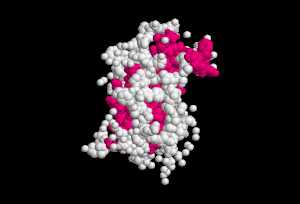Growth hormone deficiency
| Growth Hormone Deficiency | |
|---|---|
 |
|
| Growth hormone | |
| Classification and external resources | |
| Specialty | Endocrinology |
| ICD-10 | E23.0 |
| ICD-9-CM | 253.3 |
| OMIM | 262400 |
| DiseasesDB | 5447 |
| MedlinePlus | 001176 |
| eMedicine | med/930 |
| MeSH | D004393 |
Growth hormone deficiency (GHD) is a medical condition, caused by problems arising in the pituitary gland, in which the body does not produce enough growth hormone (GH). Growth hormone, also called somatropin, is a polypeptide hormone which stimulates growth and cell reproduction.
Growth hormone deficiency has a variety of different negative effects at different ages; for example, in newborn infants, the primary manifestations may be hypoglycemia or micropenis, while in later infancy and childhood, growth failure is more likely. Deficiency in adults is rare, but may feature diminished lean body mass, poor bone density, and a number of physical and psychological symptoms. Psychological symptoms include poor memory, social withdrawal, and depression, while physical symptoms may include loss of strength, stamina, and musculature. Other hormonal or glandular disorders frequently coincide with diminished growth hormone production.
The most common cause of GHD (representing two-thirds of cases) are pituitary and parasellar tumors. The origin of adult GHD may be congenital or acquired. Of those adult GHD that are acquired, roughly 15% are idiopathic, 50% are from pituitary tumors, 20% from extrapituitary tumors, and 5% from infiltrative or inflammatory lesions.
GH deficiency can be treated through growth hormone replacement, injections of growth hormone, or radiation or surgical treatment of tumors.
Growth hormone deficiency can be congenital or acquired in childhood or adult life. It can be partial or complete. It is usually permanent, but sometimes transient. It may be an isolated deficiency or occur in association with deficiencies of other pituitary hormones.
...
Wikipedia
